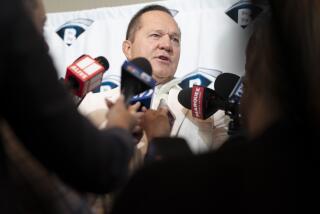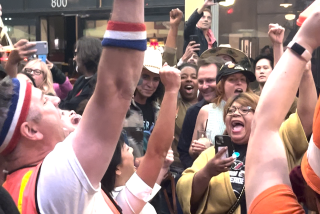Tentative Accord Brings End to Strike : An Agreement Is Reached One Day After the Walkout and 75 Minutes After Ueberroth Enters the Negotiations
- Share via
NEW YORK — The major league baseball strike apparently ended Wednesday, less than 24 hours after it began and 75 minutes after Commissioner Peter Ueberroth entered the negotiations for the first time since they began eight months ago.
“We have an agreement,” said Barry Rona, general counsel to the owners’ Player Relations Committee, as he went into the union’s offices to try to complete the package. “We just have to work out the language.”
They were apparently still doing that Wednesday night as a scheduled news conference was postponed repeatedly while the lawyers pored over the language in the agreement. At 7:45 p.m. EDT, Lee MacPhail, chief negotiator for the owners as head of the Player Relations Committee, said lawyers for both sides were reviewing the document and that was the cause for the delay; the news conference originally had been set for 5 p.m.
Thirteen games were not played Tuesday, the first day of the strike. Another 12 games scheduled for Wednesday were not played. It was not immediately clear how or if they would be made up.
It was Ueberroth’s office that announced a tentative settlement. The talks began early Wednesday morning. He entered them at 11 a.m. and at about 12:30 p.m., his office released a statement saying, “A tentative understanding has been reached between the two parties in settlement of the strike.”
The agreement apparently calls for an increase in the owners’ contribution to the players’ pension fund and some changes in the salary-arbitration system. Both issues, but especially the salary arbitration, have been the main sticking points in the negotiations, which have been going on since November.
Sources said that under the salary arbitration plan, the current two-year eligibility requirement will be raised to three years but will not go into effect until 1987. This means that players who are rookies this year will not be able to file to have their salaries reviewed by an arbitrator until they have completed three full seasons of major league service. Any current player with at least one full year of service will not be affected by the change and can file for arbitration after his second full year.
There apparently will be no limit or salary cap on the award by an arbitrator. The owners had been demanding a 100 percent limit on salary increases.
The pension issue was another sticking point. It was believed that the owners will make a $14 million retroactive payment for 1984 and contribute an average of $32.7 million during the other five years.
The payments apparently will be on a graduated scale, beginning with a $27 million payment and going up to $37 million.
Edward Bennett Williams, owner of the Baltimore Orioles and member of the PRC’s four-man executive committee, which sets owner policy, said neither side could claim victory.
“If you have a resolution in this kind of thing that’s fair, both sides will walk away disappointed,” Williams told a reporter. “I think both sides walked away disappointed. Neither side got everything it wanted.”
Scott McGregor, player representative for the Orioles, felt he had what he wanted: a return to the game.
“I called the all the players two or three times. It’s a great settlement,” said McGregor from Toronto, where the Orioles had been scheduled to play.
Throughout the past eight months of negotiations, McGregor has never been enthusiastic about striking. “We get the salary arbitration and the pension plan is great,” he said. “The three years doesn’t bother me too much, because you’ve got to play before you get your money, anyway. There’s nothing wrong about having to play three years before going to salary arbitration.”
Tuesday, the two sides met for about nine hours in four separate meetings, the last of which ended at about 11 p.m. amid conflicting statements about what was accomplished.
Bob Fishel, American League executive vice president and spokesman for the owners, quoted MacPhail as saying, “We made some progress, especially in the field of salary arbitration and the benefit (pension) plan.”
Fehr, however, was not as optimistic.
“I understand why they (the owners) would want to put the best face on it,” Fehr said. “But we ought not to minimize where we are. And where we are is, we have a strike.”
At a news conference after the third session Tuesday, Fehr tried to dispel any rumors of an agreement.
“I understand there are rumors circulating that we are close to an agreement,” Fehr said. “If that was true, they must be negotiating with somebody else. I’ve never said we’re close to an agreement, I’ve never thought we were close to an agreement. The fact is we are hung up still on the salary arbitration and salary-cap issues.”
In the past few days, it had appeared that salary arbitration had become the major stumbling block, because it involved a conflict of principles, as opposed to just a question of money. The owners had been adamant that the salary arbitration system, combined with free agency, was a major cause of the financial problems they say they are fighting.
The pension-fund issue also was thorny. The players have traditionally--but never contractually--received one-third of the network television contract. Under the old Basic Agreement that expired Dec. 31, the players received $15.5 million a year. But in 1984, the owners signed a six-year, $1.1 billion deal with the networks.
The union originally wanted to continue the one-third relationship, which would be $60 million a year.
More to Read
Go beyond the scoreboard
Get the latest on L.A.'s teams in the daily Sports Report newsletter.
You may occasionally receive promotional content from the Los Angeles Times.










